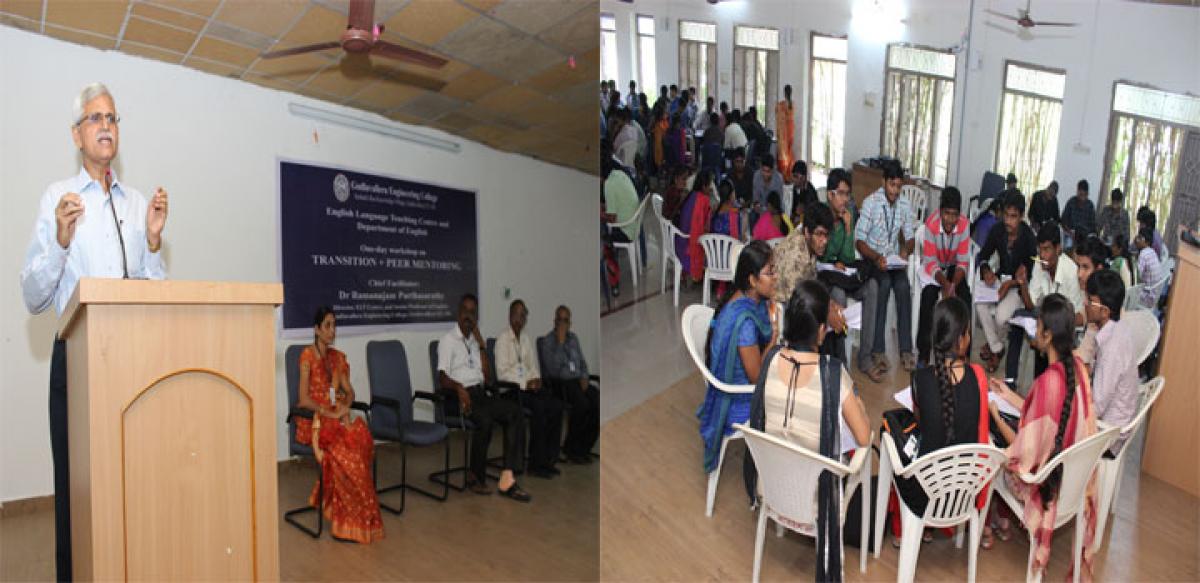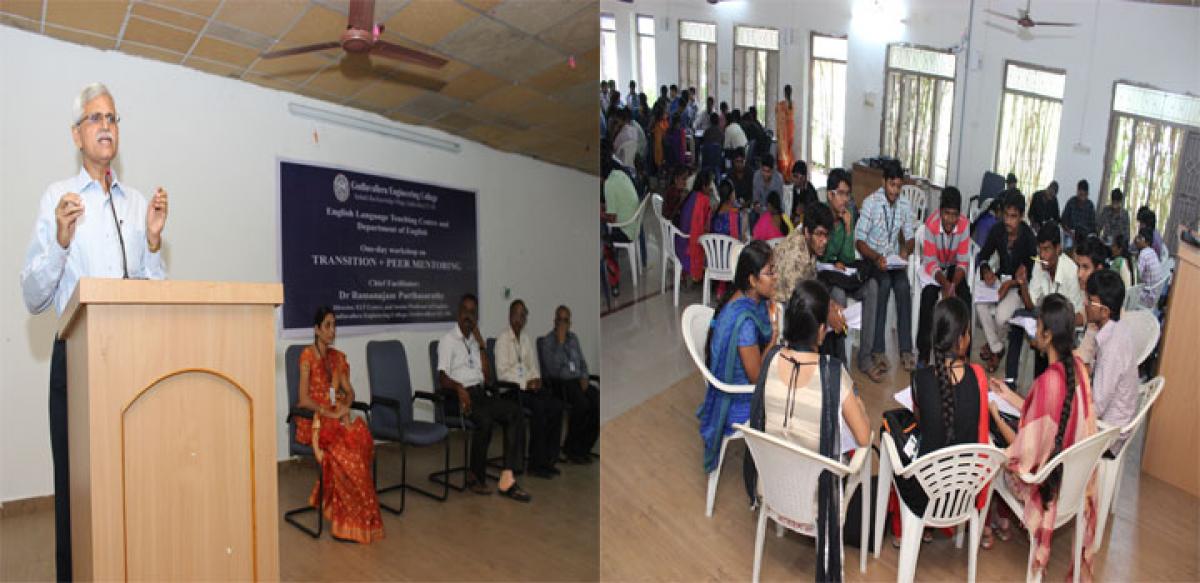Live
- VIP Treatment: Exclusive Benefits for High Rollers in Online Casino
- LS polls: Union Minister Bhagwanth Khuba, Dingaleshwara seer, Priyanka Jarkiholi file nominations in K'taka
- Amid show of strength, Congress’ Praniti Shinde files nomination from Solapur
- Tamil Nadu Police gives clean report to Isha Foundation in missing volunteers case
- Home Minister Amit Shah to address public meeting in Goa on April 24
- Gurgaon Open: M Dharma fires 67 for two-shot lead on penultimate day
- Sharad Pawar made many attempts to finish Shiv Sena, claims Maha minister
- Former England opener Raman Subba Row dies aged 92
- IPL 2024: Impact player rule is affecting the progress of half all-rounders, says Zaheer Khan
- ‘Teppa samudram’ review: Entertains with twists and turns
Just In
Peer mentoring ensures smooth transition of freshers in college


One of the problems of first-year students in any engineering college is to effect a transition from being school students to becoming budding engineering professionals.This places two demands on them: one, they have to cope with the requirements of a new system and settle into college life,

Gudlavalleru Engineering College (GEC), which is in a remote rural area has identified 325 student volunteers, who have been found to be suitable to play the role of mentors in terms of their proven social, academic and cognitive qualities. They will mentor the college entrants, the first-year B Tech students, throughout the academic year
Hyderabad: One of the problems of first-year students in any engineering college is to effect a transition from being school students to becoming budding engineering professionals.This places two demands on them: one, they have to cope with the requirements of a new system and settle into college life,
and, two, they have to develop strategies for working rather independently, as the “spoon-feeding” of the kind they were used to in their school life is not possible here. These twin demands make transition into college life difficult for a vast majority of college entrants.
Colleges do not have an institutional mechanism that can help the new entrants achieve the necessary transition which is essential for their academic success.
‘Considering that mentoring is not widely practised in educational institutions and that peer mentoring is almost non-existent, it is gratifying that Gudlavalleru Engineering College (GEC), which is in a remote rural area, is introducing peer mentoring,
and I must congratulate both the students who have volunteered to work as peer mentors on the programme and the college management on being so progressive and innovative,’ said Dr P. Ramanujam, Director, English Language Teaching Centre, GEC, at the launch of the Centre’s R&D project on peer mentoring.
Hence this project of peer mentoring (PM) on which 325 student volunteers, who have been found to be suitable to play the role of mentors in terms of their proven social, academic and cognitive qualities, will mentor the college entrants, the first-year BTech students, throughout the academic year.
As peer mentors, each of the 325 students will render two kinds of mentoring services. One of them is social transition. They will help the mentees – the three students in their care – settle into college life. Secondly, they will go beyond this social transition and do academic mentoring as well throughout the academic year,
especially in helping the mentees improve their communication skills in English in order to help them perform better in academic tasks, including examinations. Hence the plus (+) element attached to “transition” in the title of the project, ‘Transition+ Peer Mentoring.’
The launch of the project was followed by a one-day workshop, the initial one in a series of workshops proposed to be conducted on the project, for the 325 mentors to prepare them for their role on the PM programme with Dr P Ramanujam as the chief resource person and Dr M Vijaya Lakshmi, Mr B Kalyan, Mr G V Chandrasekhar, and Mr G Raja Kumar as the other resource persons.
The workshop concluded with this appeal from the Facilitator: ‘Be kind in doing your work as a peer mentor. And grow in kindness. You must have received kindness in myriad ways and myriad forms from myriad people. This is an opportunity for you to give back that kindness. Kindness is not meant to be stored; it is meant to be shared. Store it and you will remain poor. Give it and you will grow richer – richer in heart, richer in spirit. That’s the spirit behind peer mentoring.’
‘The workshop was at once informative, reflective, analytical and persuasive,’ said M Tanuja Kalyani, one of the mentors from the CSE branch.
‘It gave us a wealth of information on the mentoring process, it made us reflect through activities on the qualities required of a mentor and gain awareness, it led us to analyze case-studies and draw insights about the mentoring process, and it persuaded us to believe that our mentoring efforts would help us develop a variety of skills such as organizational abilities, communication skills,
leadership qualities, and emotional maturity,’ said N Sri Harsha, another mentor from the EEE branch. This impression was endorsed by the written feedback given by the other participants.

© 2024 Hyderabad Media House Limited/The Hans India. All rights reserved. Powered by hocalwire.com






